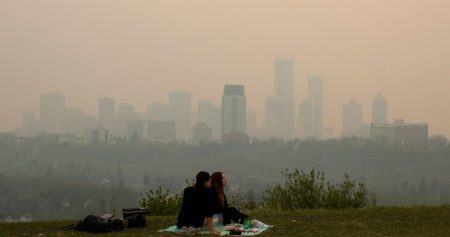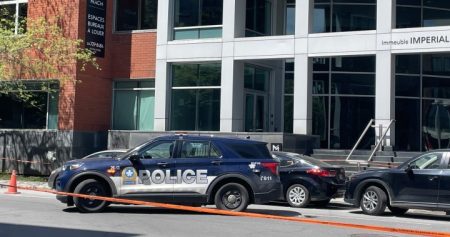Wildfire season in Alberta and British Columbia has begun early, prompting concerns over the potential devastation that fires could cause this year. Last year, wildfires in Canada burned a record 18.5 million hectares of land, surpassing the previous record set in 1989. The fires not only had a significant impact on the environment but also resulted in poor air quality for millions of people in Canada and the United States. As a result, the federal government is set to provide an update on the wildfire outlook for the 2024 season, with key ministers discussing the current situation and potential risks.
B.C. and Alberta are expected to be the focus of this year’s wildfire season, with at least one fire in the Quesnel area of B.C.’s Interior already listed as out of control. The dry conditions in the area have helped fuel the blazes, with the B.C. Wildfire Service reporting multiple wildfires south of Quesnel and east of Vanderhoof. The province of British Columbia is also facing the threat of entering unfamiliar territory with drought, as persistent drought conditions dating back to 2022 have led to multi-year precipitation deficits. Satellite photos show rivers in the province running narrower and shallower than in previous years, indicating potential water scarcity and other challenges for the upcoming season.
The head of British Columbia’s River Forecast Centre, Dave Campbell, warns of the cumulative effects of the drought conditions and lower than average snowpack levels recorded in the province this past winter. He anticipates a challenging summer ahead, with potential water shortages and other difficulties due to the lack of moisture in the environment. Campbell emphasizes the need for preparedness and strategic planning to mitigate the impact of the wildfires and address the challenges posed by the current conditions. The government’s joint press conference will likely shed light on the strategies and resources in place to manage the upcoming wildfire season.
The devastation caused by wildfires in Canada last year has raised concerns about the increasing risk of wildfires and the need for proactive measures to prevent and manage such disasters. The federal government’s response and efforts to address the challenges posed by the wildfires, especially in B.C. and Alberta, will be closely monitored as the 2024 wildfire season unfolds. With the impacts of climate change exacerbating drought conditions and fueling the spread of wildfires, effective strategies and collaboration between federal, provincial, and local authorities are crucial to protecting communities and mitigating the environmental impact of these disasters.
The increasing frequency and intensity of wildfires in Canada highlight the urgent need for comprehensive and coordinated efforts to address the root causes of these disasters. Climate change, land use practices, and other factors play a significant role in the spread of wildfires and their impact on communities and ecosystems. By investing in wildfire prevention, early detection, and effective response strategies, authorities can minimize the risks associated with wildfires and protect both people and the environment. The federal government’s commitment to addressing the challenges posed by wildfires will be pivotal in shaping the response to this year’s wildfire season and in promoting resilience and sustainability in the face of climate-related disasters.
As the federal government provides an update on the wildfire outlook for the 2024 season, stakeholders, communities, and individuals must remain vigilant and prepared for the potential risks and challenges ahead. The lessons learned from past wildfire seasons, combined with proactive measures and collaboration, can help mitigate the impact of wildfires and enhance the resilience of affected regions. By prioritizing environmental sustainability, disaster preparedness, and community engagement, Canadian authorities can work towards a safer and more sustainable future in the face of escalating wildfire risks. The joint efforts of government officials, emergency responders, and the public are essential in addressing the complex and evolving challenges posed by wildfires and building a more resilient society.















